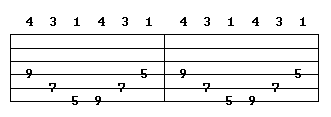This exercise is aimed at improving your technique, building strength in your hands and improving your double picking across strings. It may also help you to develop some interesting and original chops that you can work into your solos.
Click here if you’re not sure how to read the scale blocks.
The basic idea is to find a pattern ..

and then make a mirror of it ..

Now, play them together. In this example, I am starting on the 4th finger of the first block.
Notice the fingering suggestions across the top of the tableture.
Click on the tableture for an MP3 audio example.
Now, lets extend this somewhat by mirroring all the notes between the the first set of notes we just played.
Click on the tableture for an MP3 audio example.
I am providing a 3rd audio example here. The first 2 were played slow and with a clean sound. If I play the previous example faster and with distortion, we end up with perhaps a great intro for a rock song or a nice fill for a solo.
Click here for example 3 ( faster with overdrive )
In my opinion, it is best to practice your scales and exercises with a clean sound as you will more easily hear the mistakes that distortion hides so nicely. Play it correctly with a clean sound, and your over-driven playing will sound way better.
Suggestions:
Mirrors can be a lot of fun to play with. Remember that this exercise can be played anywhere on the neck. If you find that this pattern is to big of a stretch for you, play it higher up the neck.
For a GREAT s t r e t c h, move it down and play it on the 1st fret to the 5th fret.
Experiment. Invent your own mirrors. They can be on 2 strings, 3 strings, any number of strings really. Just let your imagination go and above all else, trust your ears. They’ll let you know when you have found something musically interesting.
When practicing any exercise, always start off slowly. Play precisely and cleanly remembering to double pick ( pick .. down, up, down, up, down etc.). Speed will come but you will see much better results if you work on precision first.
© Synaptic Systems Inc., 2000







Speak Your Mind